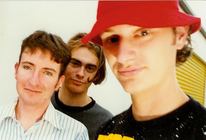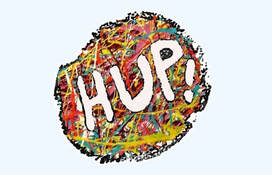 I N T E R V I E W Justin Harris of Inchworm by Ian Duggan One of the major aims of ‘Hamilton Underground Press’ is to enable musical and artistic happenings in Hamilton. One way of facilitating this is if new and current bands can gain insights from bands that have had success in the past, on how they went about promoting themselves and how they found their success. This is our second interview in a series with Hamilton musicians, from a variety of genres, who have found success in a variety of ways. In this interview I am talking with ‘Justin Harris’ from popular 1990s indie-pop band ‘Inchworm’, now Japan-based and recording as ‘Elider’. Between 1993 and 1999 ‘Inchworm’ released an EP and two albums, were awarded ‘NZ On Air’ funding for three music videos and self-funded two others — all of which received TV airplay — played numerous well-attended gigs in Hamilton and elsewhere in New Zealand, and also the Big Day Out festival. HUP: ‘Inchworm’ burst onto the scene, winning the 1993 ‘Waikato Rock Awards’. You went on to release one EP and two albums, played numerous well-attended gigs, and your videos got considerable airplay on television. Firstly, how did you initially build your audience? Justin: Luck and hard work. I'm not sure of the ratio though. Luck because we gained quite a lot of exposure early on by winning a competition called the ‘Waikato Rock Awards’. Work, because I think we worked hard to write solid, memorable songs that people wanted to see played again and we put a lot into gigs. After playing we were all pretty much exhausted. It wasn't just standing around looking at the floor anyway. Also, we, and other bands at that time, were lucky to have the support of many different media outlets that seemed willing to cover local music. The Waikato Times, community newspapers and Nexus in print and Contact FM and even sometimes The Rock in radio. Plus at that time there were some new music video stations and programs starting (‘Max TV’, ‘Frenzy’) that were keen to play New Zealand music, of which there was still quite a lack of. So they would playlist some of our music videos. And on that note, we were surrounded by people who were incredibly good at what they did: Greg Page making our videos, Scott Newth and Greg Locke as producers, Kirstin Marcon and Katrina Webb as designers. While we were "fiercely independent", so went the press line, that didn't mean we did everything ourselves. HUP: So considering things that are in your control, besides writing great songs, a big part of your success comes down to exposure. The loss of Contact FM is likely an impediment to Hamilton bands today, but at the same time the internet has opened up other opportunities. Given the change in environment, how would you go about gaining that exposure today? Or, with the gift of hindsight, what might you have done better to gain further exposure? Justin: Those are quite difficult questions to answer. I'm not really sure what we could have done to gain further exposure at that particular time, when New Zealand music wasn't so popular in the eyes of the public. I think bands these days do have the luxury of a potential audience of New Zealanders who are proud of, or at least interested in, local music more so than when we were playing. By the mid ‘90s we had started embracing the internet and were for example featured on the front page of a popular music website at the time. I guess if we had continued playing we would have made the internet one of our main focuses. HUP: You toured around New Zealand on several occasions. Was that a worthwhile experience for gaining exposure?
Justin: Touring around New Zealand — we did three full national tours — was a very worthwhile experience. First and foremost it was really fun traveling together and seeing the country. We would always travel down and play a weekend of shows in, for example, New Plymouth, Palmerston North, and Wellington. And then we would travel to the South Island on the Sunday or Monday. Because the next shows in the South Island weren't usually until the following Thursday or so, we would travel around for a few days looking around the Nelson area, the West Coast, the glaciers, Wanaka, Queenstown, etc. It was so much fun and great bonding for the band. The other main advantage of doing this was we got to meet people around New Zealand who were doing the same thing we were, making music, putting on shows, etc. It was great for networking. Depending where and when we played we got quite good crowds so we didn't lose too much money either. We found that people tended to take us a little more seriously in that we were touring the country and were able to pull in an audience in most places. That wasn't always the case though course. Sometimes we would play to 100 people one night and then a lot less another. Sometimes with a university organized gig, there was a huge turnout and then other times not at all. The worst night was one person turning up to see us in Nelson. HUP: When you got good crowds, was it because you were already known before touring, or was it because you were playing with bands established in the towns you were visiting? Justin: I think the reason we got good crowds was either if it was an organized event with other people, or a bigger city where people had seen our music videos — for example, Christchurch, which had a music TV channel, and also was accepting of live rock music, and also Wellington, which had a number of bands in a similar vein to us, and so were used to that kind of thing. For most of the time we were together, Auckland was going through a big dance faze, so it was difficult for us to build an audience there until just before we split-up when guitar music was starting to come back into vogue there. I think a lot of bands and musicians wouldn't like to admit that a lot of success is based on timing. Timing is very key here. [For example], timing-wise, The Datsuns were spot on. They had been playing rock music for years, and suddenly it became popular again, and by that time they were doing it amazingly. In the end you just have to do what you want to do, and if you do it well enough and the timing is right, maybe you'll find some success. HUP: You have recently been recording as a solo artist, under the name ‘Elider’. Can you tell us a little about that project, and how you aim to get your new music out there? Justin: ‘Elider’ is the name I use for the music I'm recording at the moment, which is a mix of older songs and newer that I would like to ‘release’ at some stage. I was talking to [Hamilton producer] Scott Newth about this recently and we were discussing how the idea of ‘releasing’ music these days for smaller artists is complicated. Releasing how? And to who? And perhaps even why? The latter is easier to answer for me though. I just want to see the songs finished and go out somewhere. So anyway, I've been working on a set of songs, which could make an album and which Scott Newth has been helping me with over the last few years. We added some drums with the help of the Ben [Cole] from The Datsuns when I was back in New Zealand briefly in February this year. That really made some of the songs come alive I think. And then we recorded a whole lot of other songs that would constitute a second ‘album’ with Ben and [‘Grok’ and ex-‘Inchworm’ bass player] Scott Brodie, so now the issue is trying to mix them and get them tidied up. I would like to try to release them and then maybe even do a couple shows one day when back in New Zealand with an ad lib band. Ian Duggan
0 Comments
Leave a Reply. |
Archives
July 2022
Categories |

 RSS Feed
RSS Feed
